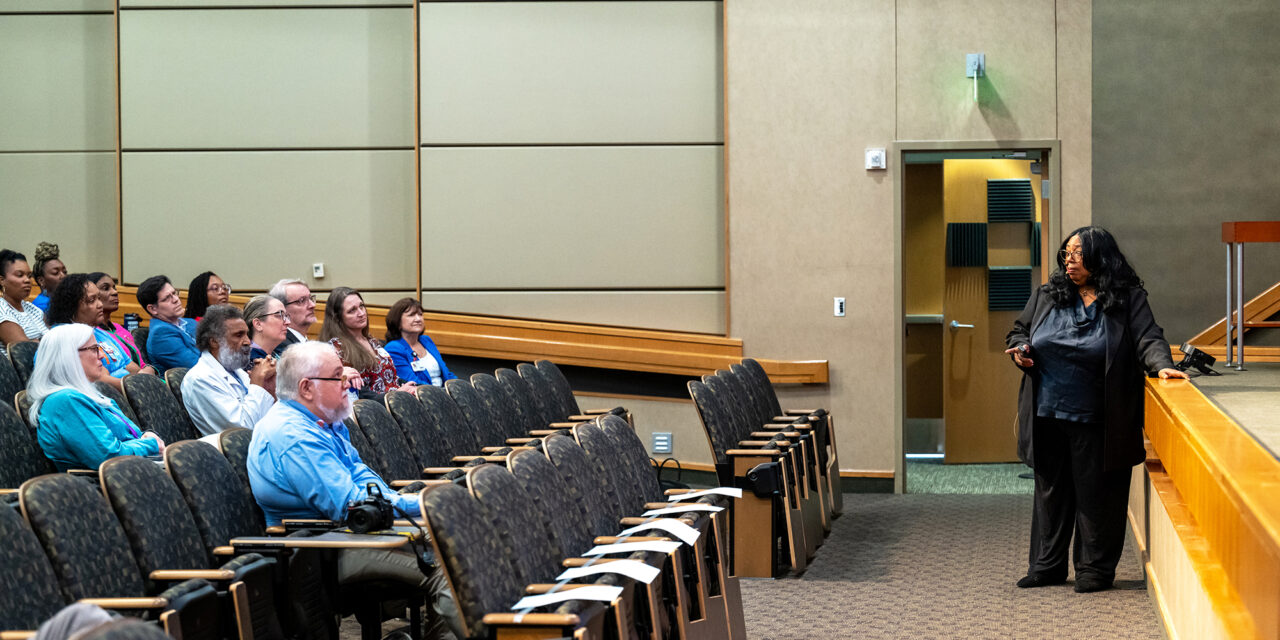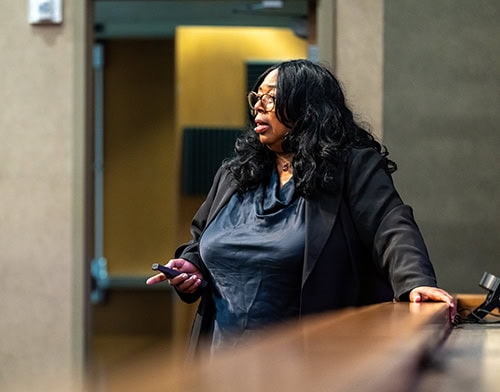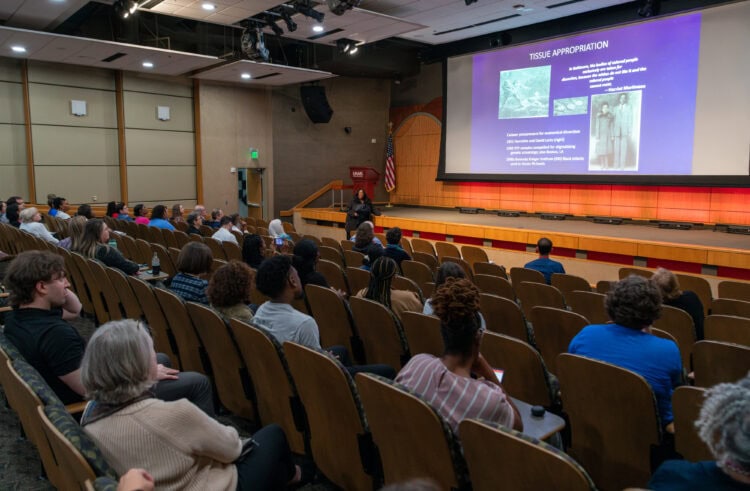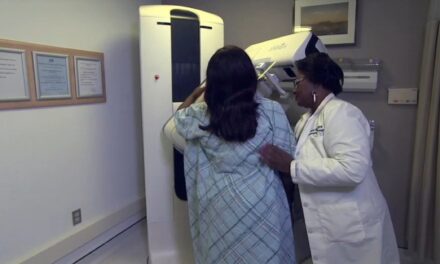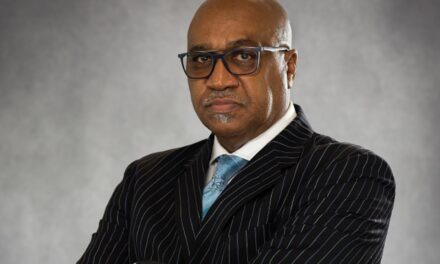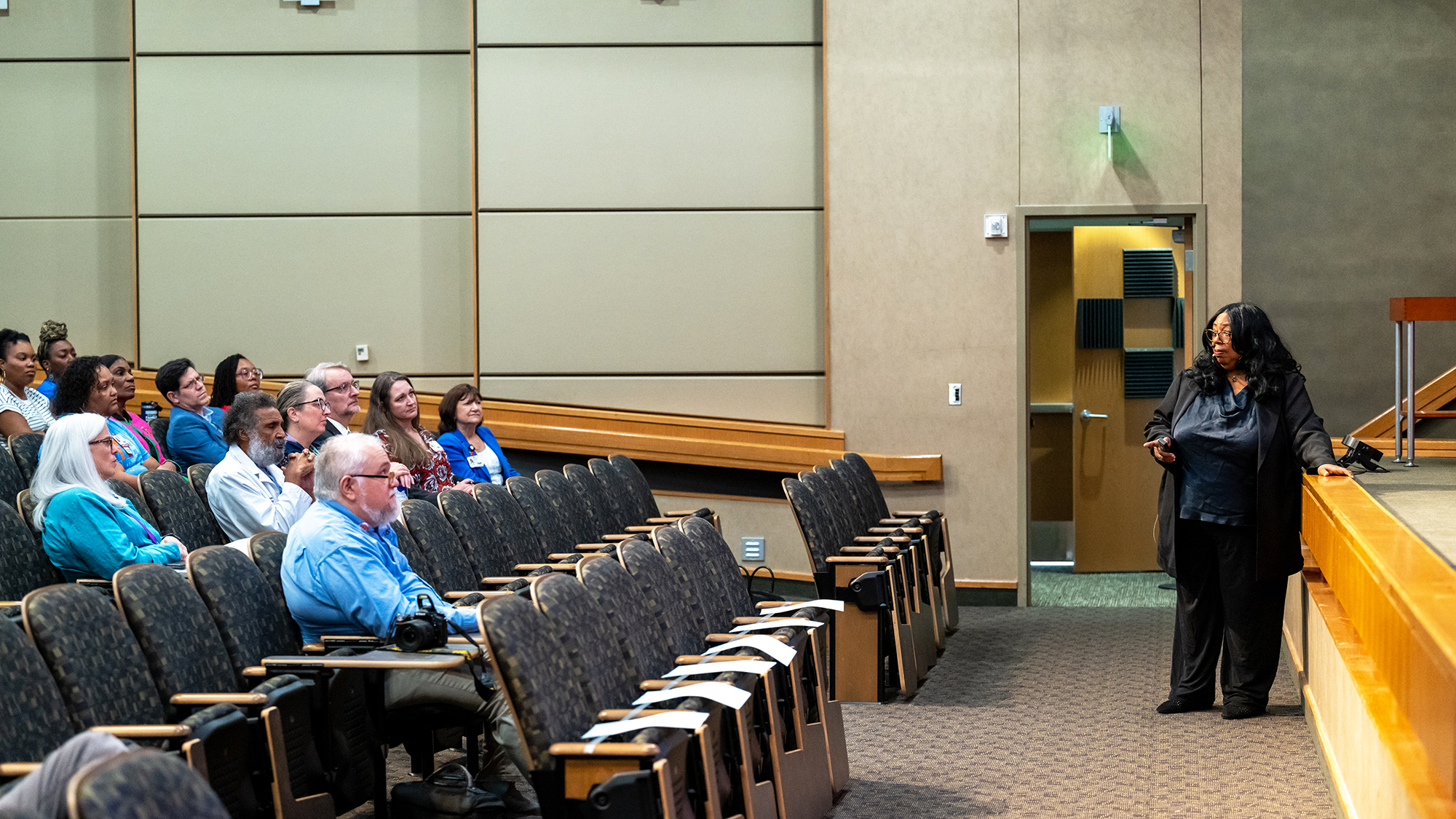
View Larger Image 
Harriet Washington stands in front of the stage in Smith Auditorium while discussing how racial attitudes and prejudices have led to injustice and disparities in health care. Image by Bryan Clifton
Oct. 7, 2024 | The history of U.S. health care has long ignored the impact of and on African Americans, and Harriet Washington wants to change that.
On Sept. 25 at the University of Arkansas for Medical Sciences (UAMS), she presented “Medical Apartheid … and Beyond” as part of the Winthrop P. Rockefeller Distinguished Lecture series.
Harriet Washington delivers the Winthrop Rockefeller Distinguished Lecture at UAMS. Image by Bryan Clifton
Washington, an award-winning medical writer and ethicist, is the author of the best-selling book, “Medical Apartheid: The Dark History of Medical Experimentation on Black Americans from Colonial Times to the Present.”
“African Americans have been carefully elided from the history of medicine. I wanted to cure that and bring African Americans back to the forefront, and make people understand how they have been treated in the past and how that has affected how they are seen and treated today through the medical gaze,” she said.
From early colonial America to the late 20th century, bodies of deceased African Americans have been used as mere means to medical and scientific ends. For example, deceased African Americans were appropriated without consent for dissections by students and teaching physicians in medical colleges and institutions. Washington said they were viewed as less than human by many white physicians who erroneously believed Blacks experienced pain with much less suffering, were resistant to very hot weather conditions and were immune to many diseases.
Washington argued that those 18th century beliefs are still very much alive, citing a 2016 study done by the University of Virginia that showed that 50% of medical school respondents to a survey believed Black people did not feel pain like whites did.
“The misconception about pain is insidious. Pain in sickle cell patients tends to be dismissed,” she said. “We have a dangerous system now where medical students in training, part of their tacit education is seeing Black patients being routinely labelled as drug seeking and malingering.”
Such prejudices carry over into research. As an example, Washington discussed a study of the high prevalence of asthma among Black children living in an apartment building in Harlem, New York. Such a study, she said, might start with a hypothesis that the affected children have a genetic vulnerability making them prone to the condition instead of looking first at environmental causes, such as air pollution from a nearby bus depot.
Washington also discussed several pioneers in medical discoveries who were indifferent to Black suffering and harbored deep prejudice against African Americans, especially James Marion Sims, a world-renowned U.S. surgeon in the 19th century, considered the “father” of modern gynecology and obstetrics. Sims’ callous treatment of Black female patients has carefully been documented.
“He was a paragon of virtue to an older generation of physicians. We don’t ask how our heroes got there. Often, they got there on the backs of African Americans,” she said. “We need to look at people’s ethics as well as their accomplishments.”
Despite the United States’ long history of injustice toward people of color in health care, Washington suggested there are several ways to root out systemic inequities.
Detailed and mandatory treatment guidelines for patients in different scenarios should be implemented to make sure patients with similar conditions are cared for in the same ways, especially regarding pain.
Institutional review boards, which are expert panels of clinicians and scientists who review research involving human subjects, should include more laypeople representing the participants who are being studied. Current regulations only require that one non-scientific person be on the IRB. However, one representative can easily be overwhelmed and outnumbered in discussions and review processes, she said. Washington recommended that at least half of the positions on the boards be allotted to people from communities instead of the one representative that is standard now.
During a short question-and-answer session after her lecture, she also advocated that a concerted effort be made to counter racial misconceptions when educating new health care professionals.
The audience of students, faculty and guests listens to Washington’s presentation. Image by Bryan Clifton
“Physicians are logical, educated people, but they are not immune to inculcating a belief that has been drummed into them,” Washington said, urging the audience to warn “students about these myths pedagogically. If they have never heard the myths, then how do they know to question them in studies and teaching?”
Washington came to UAMS as this year’s Winthrop Rockefeller Distinguished Lecturer. The lecture series was established in 1972 by friends of former Arkansas Gov. Winthrop Rockefeller. The endowment that funds the lecture program allows the six four-year universities in the University of Arkansas system to offer free public lectures that communicate ideas to stimulate public discussion, intellectual debate and cultural advancement.
Micah Hester, Ph.D., chair of the UAMS Department of Medical Humanities & Bioethics, led the organizing committee behind the lecture and Washington’s visit, which also included meetings and roundtable discussions with students, faculty and community members.
Hester said Washington’s “carefully researched books speak to racism and racial disparities in health care,” and “Medical Apartheid,” published in 2006, forced American medicine and research to acknowledge that many of its great accomplishments were achieved by inhumanely treating African Americans as tools rather than persons.
“Her Winthrop Rockefeller Distinguished Lecture did not simply tell us about these atrocities but called us to action — to acknowledge the myths that still pervade medicine, to demand that all persons are treated as autonomous individuals capable of making informed decisions, and thereby deserving a truly robust informed consent process before any medical care or research occur with them,” he said.
